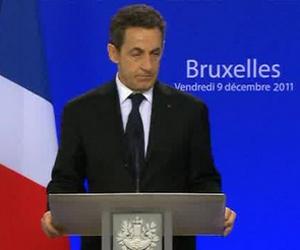Eurozone Deal Reached Without UK
Nicolas Sarkozy at Brussels Summit (BBC Video)
After 10 hours of negotiation that spilled into early Friday morning, the seventeen European countries that use the euro, plus a number of others that would like to use the share currency some day, have signed on to a deal that leaders hope will help save the euro, and stem the debt crisis currently gripping Europe.
This summit was billed as the Eurozone’s last chance to stave off impending economic doom. French President Nicolas Sarkozy and German Chancellor Angela Merkel said they wanted tough new budget guidelines for the eurozone countries, and they wanted the power to punish any country that couldn’t keep its economic house in order.
Given the scale of the problem, and the scope of the solution, Sarkozy and Merkel pushed for a European Union wide agreement, one approved by all 27 members of the EU – even the ten that don’t currently use the euro.
But Friday morning, Britain’s Prime Minister David Cameron said no, in fairly blunt terms.
“We’re not in the euro, and I’m glad we’re not in the Euro,” Cameron said. “We want the eurozone countries to come together and to solve their problems. But we should only allow that to happen if there are proper protections for the single market and other key British interests. Without those safeguards, it is better to have those countries make their arrangements separately.”
That’s exactly what France, Germany and the rest of the eurozone say they will do.
They don’t have much choice; in the European Union, treaty changes have to be approved by all member states. So they’ll forge ahead without Britain, said France’s Nicolas Sarkozy on Friday.
“Our British friends – this is not a criticism — say not only are we not in the euro, but we’re glad we’re not in it,” Sarkozy said. “And we who defend the euro, who are changing the way the euro functions and are learning from the crisis, we’re not going to apologize for doing everything we’re doing to save our currency.”
Germany’s Angela Merkel also praised the agreement.
“I’m very happy with the result because we managed not to make a useless compromise for the euro,” Merkel said. “Everybody in the world will see that we’ve learned from the mistakes in the past.”
The plan now is to adopt an “inter-governmental treaty” that would ensure tougher budget guidelines and the power to enforce them.
That kind of treaty wouldn’t require every member of the EU to sign on, according to Herman van Rompuy, president of the European Council.
“An intergovernmental treaty can be approved and ratified much more rapidly than a full fledged treaty change,” van Rompuy said, “And I think speed is also very important to enhance credibility.”
Speed is not a word many would use to describe the eurozone’s actions to stem the financial crisis up to this point. And while tighter, more centralized budget controls were on many longer-term wish lists, some say that today’s agreement doesn’t tackle the urgent issues; that Greece is all but bankrupt, and that Italy and Spain may soon follow and drag the rest of the eurozone down with them.
David Rennie, political editor at The Economist, said there’s been a disturbing lack of realization that the markets are already losing faith in the euro and a single currency.
“That kind of market panic can only be stopped with massive intervention,” Rennie said, adding that European leaders “are still, unfortunately, dragging their feet.”
In Friday’s agreement, the eurozone countries have agreed to speed up the creation of a stability or bailout fund for troubled countries. They also said they would look at boosting the amount of money in that fund.
Some experts say it will take something on the order of $5 trillion to calm the markets.
The eurozone pact also calls for providing more money to the International Monetary Fund to be used to help ailing economies.
What many were hoping for, though, was some indication that the European Central Bank would be allowed to step in and buy up government debt from countries in trouble.
Germany, however, remains firmly against that.
